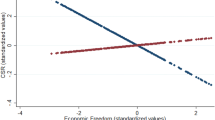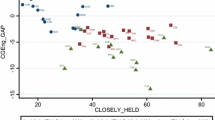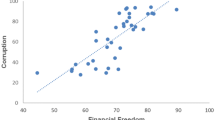Abstract
This study hypothesizes and tests whether the degree to which managers exercise earnings discretion relates to their value system (i.e., culture) as well as the institutional features (i.e., legal environment) of their country. We find that uncertainty avoidance and individualism dimensions of national culture explain managers' earnings discretion across countries, and that this association varies with the strength of investor protection. This study extends prior literature by documenting that both national culture and institutional structure are important factors that explain corporate managers' earnings discretion practices around the world, and that the influences of these factors on earnings discretion are conditional on each other.


Similar content being viewed by others
References
Ball, R. 2001. Infrastructure requirements for an economically efficient system of public financial reporting and disclosure. In R. E. Litan & R. Herring (Eds), Brookings–Wharton papers on financial services: 127–182. Washington DC: Brookings Institute Press.
Ball, R., & Brown, P. 1968. An empirical evaluation of accounting income numbers. Journal of Accounting Research, 6 (2): 159–178.
Ball, R., Kothari, S. P., & Robin, A. 2000. The effect of international institutional factors on properties of accounting earnings. Journal of Accounting and Economics, 29 (1): 1–51.
Boyacigiller, N., & Adler, N. 1991. The parochial dinosaur: Organizational science in a global context. Academy of Management Review, 16 (2): 262–290.
Brown, L. B., & Caylor, M. L. 2005. A temporal analysis of quarterly earnings thresholds: Propensities and valuation consequences. The Accounting Review, 80 (2): 423–440.
Burgstahler, D., & Dichev, I. 1997. Earnings management to avoid earnings decreases and losses. Journal of Accounting and Economics, 24 (1): 99–126.
Chenhall, R. H. 2003. Management control systems design within its organizational context: Findings from contingency-based research and directions for the future. Accounting, Organizations, and Society, 28 (2): 127–168.
Chui, A., Lloyd, A., & Kwok, C. 2002. The determination of capital structure: Is national culture a missing piece to the puzzle? Journal of International Business Studies, 33 (1): 99–127.
Dechow, P., Sloan, R. G., & Sweeney, A. P. 1996. Causes and consequences of earnings manipulation: An analysis of firms subject to enforcement actions by the SEC. Contemporary Accounting Research, 13 (1): 1–36.
DeFond, M., Hung, M., & Trezevant, R. 2007. Investor protection and the information content of annual earnings announcements: International evidence. Journal of Accounting and Economics, 43 (1): 37–67.
Degeorge, F., Patel, J., & Zeckhauser, R. 1999. Earnings management to exceed thresholds. Journal of Business, 72 (1): 1–33.
Doupnik, T., & Tsakumis, G. 2004. A critical review of tests of Gray's theory of cultural relevance and suggestions for future research. Journal of Accounting Literature, 23: 1–48.
Driscoll, J., & Kraay, A. C. 1998. Consistent covariance matrix estimation with spatially dependent panel data. Review of Economics and Statistics, 80 (4): 549–560.
Dyck, A., & Zingales, L. 2004. Private benefits of control: An international comparison. Journal of Finance, 59 (2): 537–600.
Elliott, J., & Shaw, W. 1988. Write-offs as accounting procedures to manage perceptions. Journal of Accounting Research, 26 (Suppl.): 91–119.
Fama, E. F., & French, K. R. 1993. Common risk factors in the returns on stocks and bonds. Journal of Financial Economics, 33 (1): 3–56.
Fields, T. D., Lys, T. Z., & Vincent, L. 2001. Empirical research on accounting choice. Journal of Accounting and Economics, 31 (1–3): 255–307.
Francis, J., LaFond, R., Olsson, P., & Schipper, K. 2004. Costs of equity and earnings attributes. The Accounting Review, 79 (4): 967–1010.
Gray, S. J. 1988. Towards a theory of cultural influence on the development of accounting systems internationally. Abacus, 24 (1): 1–15.
Gray, S. J., & Vint, H. 1995. The impact of culture on accounting disclosures: Some international evidence. Asia-Pacific Journal of Accounting, 2 (December): 33–43.
Guan, L., Pourjalali, H., Sengupta, P., & Teruya, J. 2006. Effect of cultural environment and accounting regulation on earnings manipulation: A five Asian-Pacific country analysis. Multinational Business Review, 13 (2): 1–20.
Harrison, G., & McKinnon, J. 1999. Cross-cultural research in management control systems design: A review of the current state. Accounting, Organizations, and Society, 24 (5–6): 483–509.
Healy, P., & Wahlen, J. 1999. A review of the earnings management literature and its implications for standard setting. Accounting Horizons, 13 (4): 365–383.
Hofstede, G. 1980. Culture's consequences: International differences in work-related values. London: Sage Publications.
Hope, O. K. 2003. Firm-level disclosures and the relative roles of culture and legal origin. Journal of International Financial Management & Accounting, 14 (3): 218–248.
Hope, O. K., Kang, T., Thomas, W., & Yoo, Y. K. 2007. Impact of excess auditor remuneration on cost of equity capital around the world. Working paper, University of Toronto, Florida Atlantic University, University of Oklahoma, and Korea University.
House, R. J., Hanges, P. J., Javidan, M., Dorfman, P. W., & Gupta, V. 2004. Culture, leadership, and organizations: The GLOBE study of 62 societies. Thousand Oaks, CA: Sage Publications.
Hung, M. 2001. Accounting standards and value relevance of financial statements: An international analysis. Journal of Accounting and Economics, 30 (3): 401–420.
Jaggi, B., & Low, P. Y. 2000. Impact of culture, market forces, and legal systems on financial disclosures. International Journal of Accounting, 35 (4): 495–519.
Kinney, M., & Trezevant, R. 1997. The use of special items to manage earnings and perceptions. Journal of Financial Statement Analysis, 3 (1): 45–53.
Kirkman, B., Lowe, K., & Gibson, C. 2006. A quarter century of Culture's Consequences: A review of empirical research incorporating Hofstede's cultural values framework. Journal of International Business Studies, 37 (3): 285–320.
Kirschenheiter, M., & Melumad, N. D. 2002. Can “big bath” and earnings smoothing co-exist as equilibrium financial reporting strategies? Journal of Accounting Research, 40 (3): 761–796.
Kothari, S. P. 2001. Capital markets research in accounting. Journal of Accounting and Economics, 31 (1–3): 105–231.
Kwok, C. Y., & Tadesse, S. 2006. National culture and financial systems. Journal of International Business Studies, 37 (2): 227–247.
La Porta, R., Lopez-de-Silanes, F., Schleifer, A., & Vishny, R. W. 1998. Law and finance. Journal of Political Economy, 106 (6): 1113–1155.
La Porta, R., Lopez-de-Silanes, F., Schleifer, A., & Vishny, R. W. 2000. Investor protection and corporate governance. Journal of Financial Economics, 58 (1–2): 3–27.
Leung, K., Bhagat, R., Buchan, N., Erez, M., & Gibson, C. 2005. Culture and international business: Recent advances and their implications for future research. Journal of International Business Studies, 36 (4): 357–378.
Leuz, C., Nanda, D., & Wysocki, P. D. 2003. Earnings management and investor protection: An international comparison. Journal of Financial Economics, 69 (3): 505–527.
Lewis, P., & Salter, S. 2006. Europe and America – Together or apart: An empirical test of differences in actual reported results. In J. T. Sale (Ed.), Advances in international accounting, Vol. 19: 221–243. Greenwich, CT: JAI Press.
Lopez, T., & Rees, L. 2002. The effect of beating and missing analysts' forecasts on the information content of unexpected earnings. Journal of Accounting, Auditing & Finance, 17 (2): 155–184.
Radebaugh, L., Gray, S., & Black, E. 2006. International accounting and multinational enterprises, (6th ed.). Hoboken, NJ: John Wiley & Sons.
Salter, S. B., & Niswander, F. 1995. Cultural influence on the development of accounting systems internationally: A test of Gray's (1988) theory. Journal of International Business Studies, 26 (2): 379–397.
Shleifer, A., & Vishny, R. 1997. A survey of corporate governance. Journal of Finance, 52 (2): 737–783.
Strong, J., & Meyer, J. 1987. Asset write-downs: Managerial incentives and security returns. Journal of Finance, 42 (3): 643–661.
Tucker, J., & Zarowin, P. 2006. Does income smoothing improve earnings informativeness? The Accounting Review, 81 (1): 252–270.
White, H. 1980. A heteroskedasticity-consistent covariance matrix estimator and a direct test for heteroskedasticity. Econometrica, 48 (4): 817–838.
Xie, H. 2001. The mispricing of abnormal accruals. The Accounting Review, 76 (3): 357–373.
Zarzeski, M. T. 1996. Spontaneous harmonization effects of culture and market forces on accounting disclosure practices. Accounting Horizon, 10 (1): 18–37.
Acknowledgements
We thank anonymous reviewers, Lee Radebaugh (the editor), and seminar participants at the 2007 American Accounting Association Midyear and Annual Meetings, and the 2007 European Accounting Association Annual Congress, for helpful comments.
Author information
Authors and Affiliations
Corresponding author
Additional information
Accepted by Lee Radebaugh, Area Editor, 19 February 2008. This paper has been with the authors for two revisions.
APPENDIX: DEFINITION OF VARIABLES
APPENDIX: DEFINITION OF VARIABLES
Dependent variable
- DACC:
-
Discretionary accruals estimated in the cross-sectional accruals model as in Tucker and Zarowin (2006)
- ∣DACC∣:
-
Absolute value of discretionary accruals estimated in the cross-sectional accruals model as in Tucker and Zarowin (2006)
- ∣[+]DACC∣:
-
Absolute value of positive (negative)
- (∣[−]DACC∣):
-
discretionary accruals estimated in the cross-sectional accruals model as in Tucker and Zarowin (2006)
Culture-related variables
- IND:
-
Individualism score from Hofstede (1980)
- UA:
-
Uncertainty avoidance score from Hofstede (1980)
- MA:
-
Masculinity score from Hofstede (1980)
- PD:
-
Power distance score from Hofstede (1980)
Legal environment-related variables
- INVPRO:
-
Investor protection score from La Porta et al. (1998)
- DIP:
-
1 if the investor protection score by La Porta et al. (1998) of the country is greater than average score; 0 otherwise
Control variables
- LNSIZE:
-
Natural logarithm of market value of equity
- LNBM:
-
Natural logarithm of book-to-market ratio
- LEV:
-
Leverage ratio, measured by debt to total assets
- ISSUE:
-
1 if shareholders' equity increases by more than 10%; 0 otherwise
- LOSS:
-
1 if the firm reported a loss during the year; 0 otherwise
- DYR:
-
Indicator variables for the years from 1992 to 2003
- DIND:
-
Indicator variables for industries based on two-digit SIC code
Rights and permissions
About this article
Cite this article
Han, S., Kang, T., Salter, S. et al. A cross-country study on the effects of national culture on earnings management. J Int Bus Stud 41, 123–141 (2010). https://doi.org/10.1057/jibs.2008.78
Received:
Revised:
Accepted:
Published:
Issue Date:
DOI: https://doi.org/10.1057/jibs.2008.78




